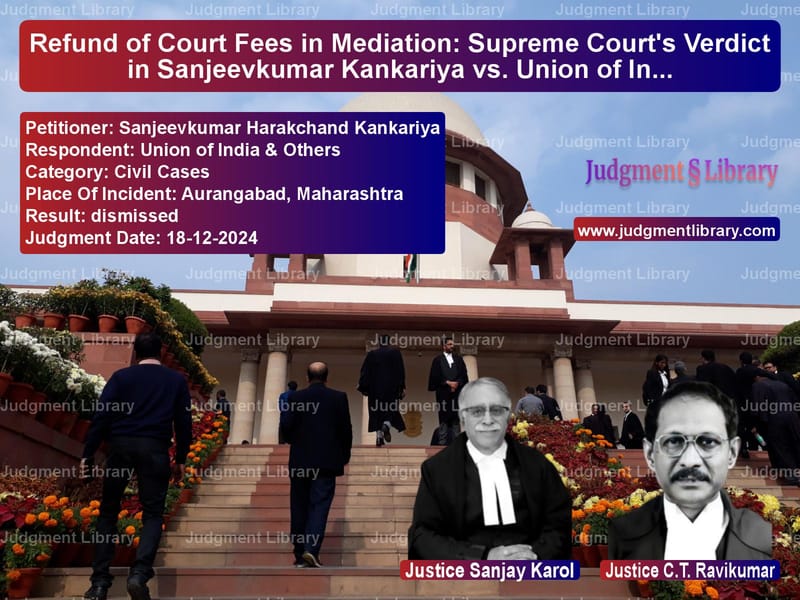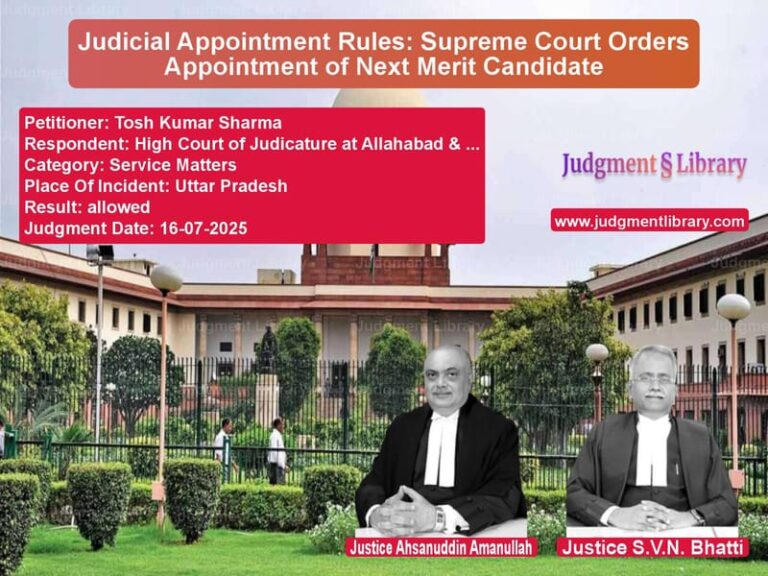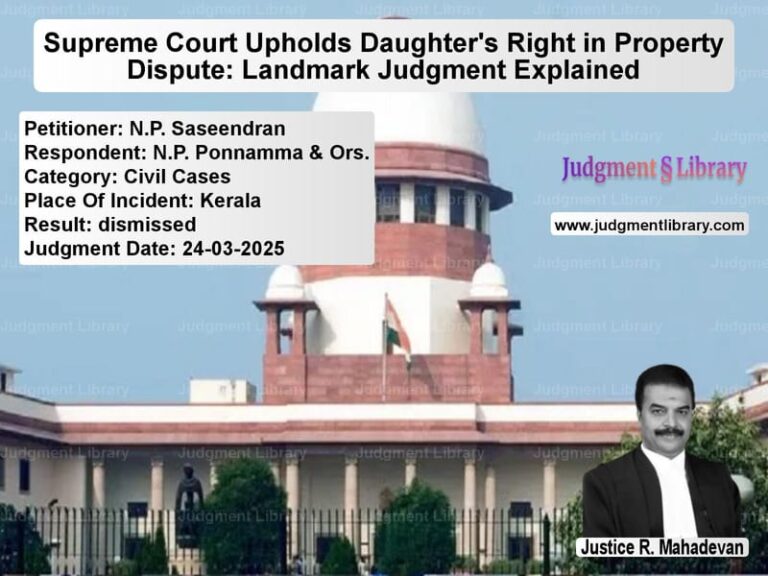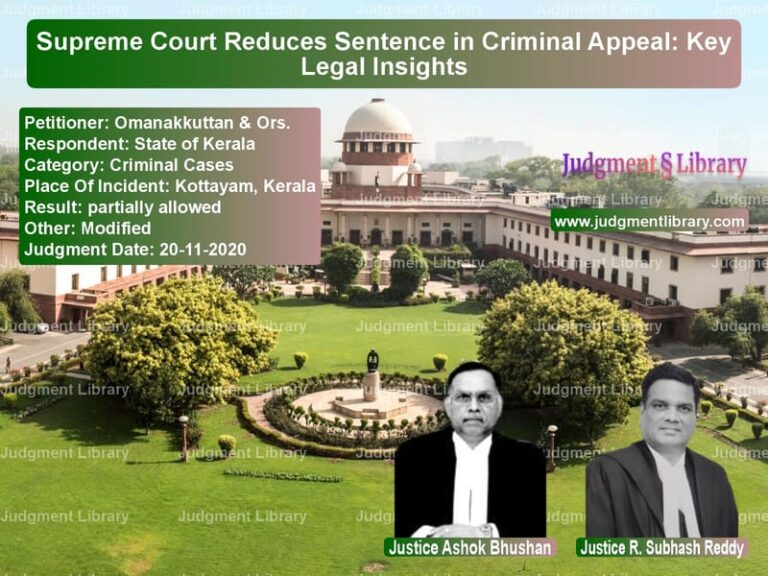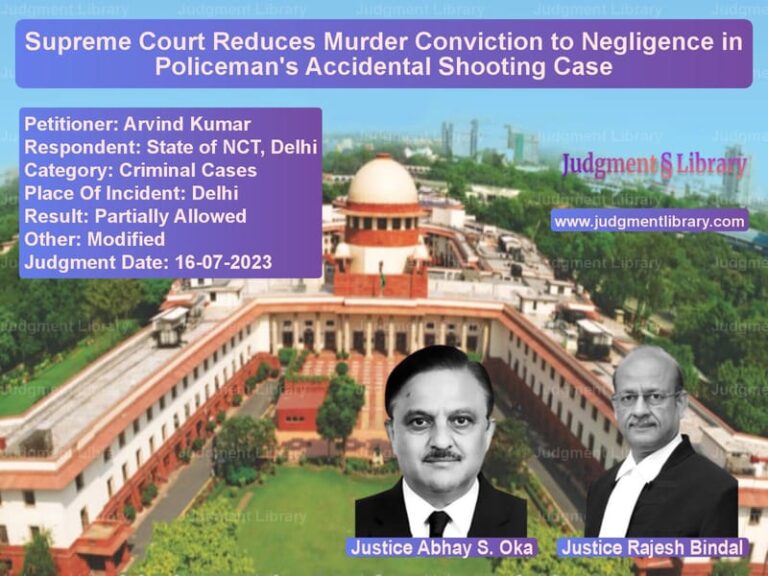Refund of Court Fees in Mediation: Supreme Court’s Verdict in Sanjeevkumar Kankariya vs. Union of India
The Supreme Court of India recently ruled in the case of Sanjeevkumar Harakchand Kankariya vs. Union of India & Others, addressing the issue of court fee refunds in cases settled through mediation under Section 89 of the Code of Civil Procedure, 1908. The judgment analyzed the interplay between central and state legislation concerning court fees and alternative dispute resolution (ADR) mechanisms.
Background of the Case
The appellant, Sanjeevkumar Kankariya, had filed a Special Civil Suit in 2013 before the Civil Judge, Senior Division, Aurangabad, seeking specific performance of a property agreement. The case was referred to mediation under Section 89 CPC and was amicably resolved. Upon settlement, the appellant sought a complete refund of the court fee paid.
The appellant’s request was only partially granted, with 50% of the court fees refunded as per the Maharashtra Court Fees Act, 1959 (MCFA, 1959). Dissatisfied with this, the appellant approached the Bombay High Court, which upheld the partial refund. The appellant then challenged this decision before the Supreme Court.
Key Legal Issues
The central issues before the Supreme Court were:
- Whether Section 16 of the Court Fees Act, 1870 (CFA, 1870) providing for a full refund should override state laws.
- Whether the State of Maharashtra had the legislative competence to regulate court fees contrary to the CFA, 1870.
- Whether the High Court erred in denying a full refund of court fees in mediation cases.
Arguments Presented
Arguments by the Appellant
- The CFA, 1870 is a central law and should prevail over the Maharashtra Court Fees Act, 1959.
- Section 16 of CFA, 1870 allows for a full refund when a case is settled through mediation, irrespective of state law.
- The Constitution provides for alternative dispute resolution (ADR) under the administration of justice, and state laws cannot restrict the benefits granted by the central law.
- Section 21 of the Legal Services Authorities Act, 1987 (LSA Act) supports full refund provisions, and a harmonious interpretation must be adopted.
Arguments by the Respondents
- The Maharashtra Court Fees Act, 1959 governs court fees within the state, and CFA, 1870 does not apply.
- The state government has the legislative competence to regulate court fees under the Constitution.
- The state law was amended in 2018 to provide a full refund for cases settled through mediation, but this amendment was not retroactive.
- Even if the impugned notification was unconstitutional, the appellant had not challenged the core provisions of the Maharashtra Court Fees Act.
Supreme Court’s Observations
The Supreme Court extensively examined the legislative framework governing court fees and ADR. Key points from the judgment include:
- Court fees fall under Entry 3 of List II (State List) of the Constitution, meaning states have legislative authority over the matter.
- Entry 11-A of List III (Concurrent List) deals with administration of justice but does not override specific provisions related to court fees.
- The Court reaffirmed that state laws governing court fees would prevail unless they were in direct conflict with a central law.
- The Court rejected the argument that full refunds should apply to mediation cases just because they apply to Lok Adalat cases under the LSA Act.
In its ruling, the Court held:
“It is inconceivable as to how a reference to mediation under CPC can be equated with a Lok Adalat award. Simply because a refund under CFA, 1870 is statutorily prescribed for Lok Adalat settlements does not mean the same should be extended to mediation cases.”
Final Verdict
The Supreme Court dismissed the appeal and upheld the Bombay High Court’s decision, ruling that:
- The Maharashtra Court Fees Act, 1959, governs the refund of court fees within the state.
- Prior to the 2018 amendment, only a partial refund was applicable in mediation cases.
- The appellant’s claim for a full refund was not maintainable.
- The Court, however, granted relief under Article 142 of the Constitution, allowing a refund in this specific case.
The Supreme Court’s judgment clarified that while ADR mechanisms should be encouraged, court fee refunds are subject to state legislation unless explicitly overridden by Parliament. This ruling reinforces the principle that states retain control over court fees and that mediation and Lok Adalat awards cannot be equated for refund purposes.
Petitioner Name: Sanjeevkumar Harakchand Kankariya.Respondent Name: Union of India & Others.Judgment By: Justice Sanjay Karol, Justice C.T. Ravikumar.Place Of Incident: Aurangabad, Maharashtra.Judgment Date: 18-12-2024.
Don’t miss out on the full details! Download the complete judgment in PDF format below and gain valuable insights instantly!
Download Judgment: sanjeevkumar-harakch-vs-union-of-india-&-oth-supreme-court-of-india-judgment-dated-18-12-2024.pdf
Directly Download Judgment: Directly download this Judgment
See all petitions in Contract Disputes
See all petitions in Specific Performance
See all petitions in Judgment by Sanjay Karol
See all petitions in Judgment by C.T. Ravikumar
See all petitions in dismissed
See all petitions in supreme court of India judgments December 2024
See all petitions in 2024 judgments
See all posts in Civil Cases Category
See all allowed petitions in Civil Cases Category
See all Dismissed petitions in Civil Cases Category
See all partially allowed petitions in Civil Cases Category

